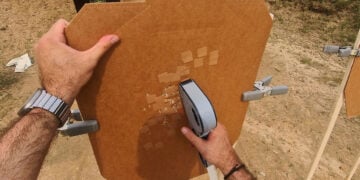In this article, we’re going to discuss developing a family mindset geared towards self-defense inside and outside the home. While staying safe at home is a number one priority, we also think it’s prudent to have several action plans prepared should something happen out in town as well. We’re going to break down the various sectors where major emergencies can occur and how you can go about developing a plan to respond.
Home security
Staying safe begins in the home. If you and your family have a reasonable idea of what to expect, how to react, and how to support one another, home security can be a lot safer and predictable for you and your family.
- Action plans — who’s going where, why, and how?
- Home defense rehearsals
Rehearsing just a basic drill for intruders coming in through different entrances and exits can help prepare your family for real-life scenarios. This can ensure people stay safer, shelter more effectively, and communicate with you and law enforcement.
It may seem silly or trite to have your children, in-laws, and spouse rushing around the house simulating a reaction to a potential break-in but there are ways to make that experience more fun, rewarding, and worthy of everyone’s time. Find ways to incorporate little mini-games with children and while we’d love to recommend some way to get teenagers involved efficiently — there’s nothing efficient about teenagers so best of luck.
Emergency plans while out in town
Disaster can strike anywhere at any time for nearly any reason. This is why we need to plan for what to do when we’re out in town. A good example is if you get separated from your family while in a mall — do you guys know how to get back into contact if something happens? What if cell phone service isn’t available — what then?
Ask yourself these questions and then work with your family to develop a plan to help get your stuff together should something happen while you’re either together or separated out in town.
Communication check-in (important)
In this age of cell phones, we take for granted the relative ease it is to get in contact with one another. That said, how often do we check in with our own family? Sometimes people take for granted that everything is going smoothly when it may not be. Practicing communication check-ins is a simple way to ensure everyone is on the same page.
An added bonus would be having a backup plan should cell phone service go down. This is something we rarely, earnestly prepare for and it’s honestly one of the first things to go down in a bad situation. Without cell phones, does your family have the means to be able to check-in with each other?
SHTF
Obviously, if everything decides to go haywire all at once, all bets are off. This doesn’t have to be a world-ending event to be SHTF for you and your family. Local calamities such as floods, wildfires, and civil unrest can cause temporary breakdowns in order. During these times, you and your family should have an idea where you should go, what to do, and how to establish the basics until order is restored.
- Assign family members roles.
- Rehearse those roles.
- Do a couple of drills using real-world circumstances.
Training to reality standards is setting yourself up for success. A very real scenario can be something like what happened during Hurricane Katrina. Millions of people were temporarily displaced as New Orleans and outlying areas had to evacuate. Order was arguably disrupted for several months and rebuilding really only started in earnest about a year or two later.









